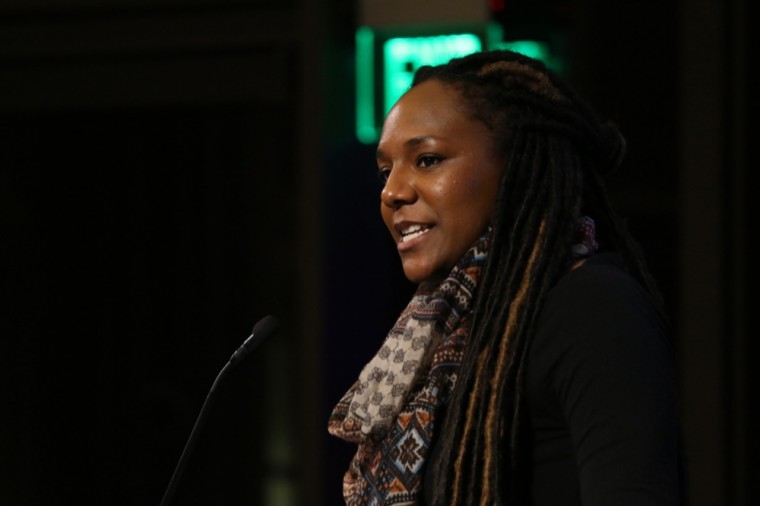News
Artist and activist Bree Newsome revitalizes discussion on grassroots organizing
Award-winning filmmaker and activist Bree Newsome discussed her experiences with the Black Lives Matter movement on Wednesday.
Newsome made headlines when she was arrested last June for taking down the Confederate battle flag that was displayed on the grounds of the South Carolina State House. Her lecture was sponsored by Black Anthology and was part of the Student Union Speaker Series.
 Allison Hamburg | Student Life
Allison Hamburg | Student Life Newsome speaks in Hillman Hall on Wednesday evening. She was most recently in the spotlight for her activism in removing the Confederate battle flag from the South Carolina State House.
Delivering a speech to a full audience in Hillman Hall’s Clark-Fox Forum, Newsome spoke on the importance of media in the Black Lives Matter movement, circumstances causing her to scale the pole in direct action and mass political education.
Newsome’s appearance was scheduled after Black Anthology—a student group which had initially received funding to book an appearance by comedian Jessica Williams—discovered that Williams’ speaking fee was around twice the amount the group had been allotted by Student Union to bring her to campus.
Hailing from North Carolina, Newsome is a graduate of New York University’s Tisch School of the Arts, where she received a BFA in film and television. In 2011, Newsome was invited to serve as the first ever artist-in-residence at Saatchi & Saatchi, a global creative communications company headquartered in New York. Newsome currently performs as front-woman for the Charlotte-based funk band POWERHOUSE. She also appears as a solo act and is at work on her debut extended play.
She dispelled the belief that one has to be on the frontlines in order to be the most impactful.
“The concept that everyone is a leader is not about abolishing hierarchies. It’s also about establishing collective responsibility; everyone can help lead the way toward a just society. Everyone carries with them skills, talents, life experience and knowledge that is valuable to this world,” Newsome said.
“I often get the question ‘what can I do?’ One doesn’t have to be an activist in the traditional sense of the word to be impactful. Every person has within them the ability to be an agent of change. We need all hands on deck, people from every field and from every walk of life. Everyone must ask themselves ‘what is at stake for me in these times?’ It’s also very important that we not allow purpose to get lost in-process. Sometimes, we get so caught in the back and forth of ‘how’ that we forget ‘why,’” she added.
She noted that much of the community organizing is not highlighted in the media.
“I can tell you that what’s really happening off-media—and that does not get any kind of coverage—is that there’s a lot of organizing going on at a very local level. This action that we did around the Confederate flag was actually a coming together of environmental justice activists and Black Lives Matter activists,” Newsome said.
The audience contained a large number of University community members in addition to St. Louis community members.
Freshman Giselle Fuselier said she appreciated the speech’s broad applicability.
“There’s a place for everyone in the movement; there’s something that everyone can do in their daily lives to advance the cause and help them move forward,” Fuselier said.
Senior Alexandra T. Mitchell, Black Anthology executive board member and producer, was thrilled that Bree Newsome’s activism aligns with the theme of Black Anthology’s show, “woke.”
“I’m a film major and she’s a filmmaker; she graduated from NYU Tisch. I went on the website for speakers and I found her on the speakers list. And she had a quote that said, “art through activism,” and that is exactly what Black Anthology is. And it was just a miraculous moment where I was like, ‘this is who we need to bring,’ and, thankfully, it worked out,” Mitchell said.
